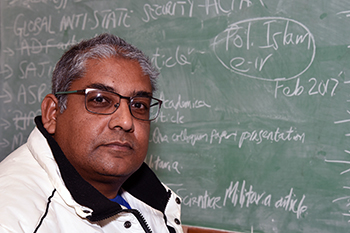
Prof Hussein Solomon from the UFS was recently
appointed as Visiting Professor at Osaka University
in Japan.
Photo: Charl Devenish
He has been involved with the Osaka University for several years, but Prof Hussein Solomon’s recent appointment as Visiting Professor will allow the University of the Free State (UFS) and Osaka to work on long-term issues.
Kovsie academics hold their own internationally
His appointment at the university in Japan came as no surprise as he is a regular teacher to students and leader of seminars to staff. According to Prof Solomon, Senior Professor at the Department of Political Studies and Governance at the UFS, Kovsie academics can hold their own internationally.
The Faculty of Humanities has a memorandum of understanding with Osaka School of International Public Policy (OSIPP), which consists of Political Science, Public Administration, Law and Economics at Osaka University.
Enhancing the universities’ relationship
“I have been involved with Osaka since 2007, initially with their Global Collaboration Center (GLOCOL), focusing on conflict resolution, and then later with OSIPP.”
Although Prof Solomon has been working with Osaka for a while, his appointment will enhance the relationship between the universities.
“We have been cooperating with Osaka for some time, hosting annual conferences, engaging in staff and student exchanges, as well as the establishment of the international centre. This appointment allows us to work on longer-term issues allowing us to chase funding together and deepen our existing linkages,” he says.
UFS doctoral students being jointly supervised
Prof Solomon says that he would like to see the doctoral students from the UFS being jointly supervised. “We already have one of our doctorial students, Alta Vermeulen, who is being co-supervised between myself and Prof Virgil Hawkins from Osaka,” he says.
Prof Solomon was also recently appointed to the board of flagship journal, United Nations Economic Commission for Africa (UNECA).